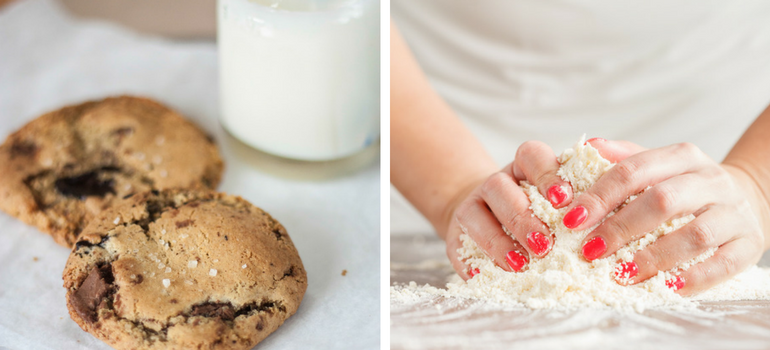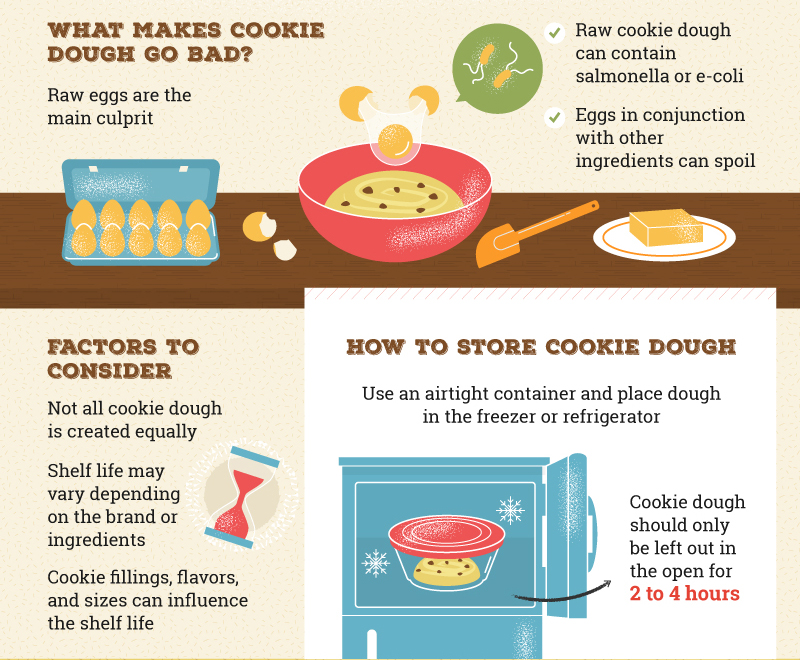
What Makes Cookie Dough Go Bad?
For the same reason mom always told me not to eat too much of it—eggs. Raw eggs are one of the main ingredients in cookie dough, which help keep the dough together and hold all of the ingredients in the right places. Raw eggs have been linked to diseases like salmonella and e-coli, which both can be quite detrimental to your health. You should never eat too much cookie dough, but after the dough is cooked, the raw eggs are no longer dangerous to your health. However, the eggs in conjunction with the sugar, butter,and other ingredients can go bad over time, making the dough and the resulting cookies unhealthy for you. So, if you know your cookie dough is bad, then it is time to whip up a new batch.
So How Long Is It Good For?
Good question. The answer is very complex, though, so let us break it down. The main thing to note is that all cookie dough is not created equal, and there are some big differences in the types that are available. They will use different ingredients and serve slightly different purposes in your cookie dough repertoire, so their shelf lives are very different across the board, and it is tough to compare them equally. For simplicity’s sake, we will break it down into three main types of cookie dough: your regular old frozen cookie dough, your mass-produced cookie dough (think Pillsbury), and your homemade cookie dough. Even within these three categories, there are too many differences to give one definite answer, but hopefully this will help give you a ballpark. Just keep in mind that cookie fillings, flavors, and sizes, among other attributes, can alter these time ranges somewhat, sometimes significantly.
Past Due Date
In most cases, you would assume that the date on your cookie dough would tell you when it was past due. The truth is that with many grains, cookie dough included, the date on the package will actually be a “best by” date and not a “use by” or “expiration” date, which is slightly different. The “best by” date simply tells you when the quality should be highest, but the product does not actually expire on that date. Let us explore the different times that cookie dough usually goes bad.
Depending on How You Store It
Another piece to note is that cookie dough, like most foods, will last longer if stored correctly. We recommend storing your cookie dough in a small airtight container in your fridge or freezer, depending on when you want to bake it. As a general rule, any cookie dough left on the counter at room temperature will be good for 2-4 hours but then may risk going bad, especially if it is already past its “best by” date. The cool, dark, air-free container in your fridge or freezer will be the best place to maximize the lifespan of your cookie dough.
Regular Old Frozen Cookie Dough
Well, hopefully, it is regular new frozen cookie dough. This will be the kind you buy from your kid’s school fundraiser or anything you find in the freezer section that is commercially produced, but not your break-and-bake style cookie doughs. If you store it in your fridge, you can usually expect this cookie dough to last about 1 to 2 weeks past the “best by” date. In your freezer, frozen raw cookie dough can actually last 9 to 12 months, giving you plenty of time to use it before it goes bad.
Pillsbury Cookie Dough
Pillsbury cookie dough, and others like it, are different in that they are meant to sit in the fridge for a little longer than your other frozen raw cookie doughs. You can safely get about two weeks of fridge life out of this type of dough, even after the “best by” date. This kind of dough is not our favorite for freezing and lasts about 6 to 9 months in the freezer. You will always be able to find this kind of dough, though, so there is no need to freeze it for too long! The best things about this kind of dough are that it is so simple to use, you can find it in pre-portioned cookie dough form, it is readily available in all supermarkets, and very affordable. We recommend this cookie dough for your quick bake sale emergencies, or when the in-laws surprise you with a visit and you want the house to smell like chocolate chips.
Homemade Cookie Dough
If you are a true baker to the core, you will likely not have needed to read the previous paragraphs. Some of us are not so great at making cookies from scratch, but if you are, your family and friends should count themselves lucky. Nothing is more delicious than a warm homemade cookie right out of the oven—except, maybe the cold cookie dough right before it goes in! Although a killer homemade cookie dough recipe will wow your guests, it unfortunately does not last quite as long as some mass-produced cookie doughs. The ingredients are generally much fresher and have fewer preservative properties, so you will not be able to keep the homemade cookie dough as long as store bought brands. You will only get about three to five days fridge life with homemade cookie dough, but if you freeze it, the dough can last anywhere from 6 to 12 months. We recommend wrapping in freezer paper tightly, or using a freezer sealing technology to get the most air out of your container before freezing—it is great to take advantage of this with homemade doughs because it is way easier to make a large batch at once and freeze some than it is to start from scratch all over again next week.
How Can You Tell?
You are getting some pretty large ranges here, from 1 to 2 weeks and from 6 all the way to 12 months, and we will remind you again that additives, flavors, and other factors can influence how long your cookie dough will last. Therefore, the question is how can you tell when yours has gone bad or is going bad? There are a few different ways, which we hope you will find to be a little more accurate than the date range test. The most obvious way to tell if your cookie dough has gone bad is to look at it. If it has grown any mold, then you can safely trash that dough and work on another batch. You will also notice that the edges start to discolor and turn darker as they go bad—they will likely be hard instead of doughy as well. This is a sure-fire sign that your cookie dough is too old. Another obvious one is if it smells rancid or sour in any way—basically, anything that looks or smells bad is bad (this is a great rule for the kitchen in 99% of cases). If your cookies taste a little funny, then you may have used bad cookie dough. At that point, we know it is tough, but it is safer to start over with some fresh dough.There are some egg-free cookie doughs out there. Thesewill last a little bit longer and refrigeration is typically not as necessary, but again, it is better safe than sorry with any kind of uncooked dough.
DOWNLOAD NOW
I'm a seasoned enthusiast in the realm of baking and culinary arts, particularly when it comes to cookie dough. My experience spans from childhood, where I relished the moments of cleaning out the cookie dough bowl after my mom baked a fresh batch. From those early days to more recent times, my passion for cookie dough has only intensified, leading me to explore various aspects of its creation, storage, and potential risks associated with its consumption.
Let's delve into the concepts touched upon in the article:
1. Raw Egg Risks in Cookie Dough:
- Expertise: Raw eggs in cookie dough pose health risks due to potential contamination with salmonella and E. coli. These pathogens can cause severe illnesses.
- Explanation: Raw eggs are used to bind and hold ingredients in cookie dough. While cooking eliminates the risk, the combination of raw eggs, sugar, butter, and other ingredients can lead to spoilage over time, making both the dough and resulting cookies unhealthy.
2. Shelf Life of Cookie Dough:
- Expertise: Not all cookie dough is created equal, and factors like ingredients, types, and storage methods influence shelf life.
- Explanation: There are three main types of cookie dough discussed: regular frozen cookie dough, mass-produced cookie dough (e.g., Pillsbury), and homemade cookie dough. Each has different shelf lives. Frozen raw cookie dough can last 9 to 12 months in the freezer, while Pillsbury cookie dough can last about 6 to 9 months.
3. Storage Recommendations:
- Expertise: Proper storage significantly impacts the lifespan of cookie dough.
- Explanation: Storing cookie dough in a small airtight container in the fridge or freezer is recommended. Dough left at room temperature is good for 2-4 hours, after which it may risk going bad.
4. Types of Cookie Dough and Their Lifespan:
- Expertise: Different types of cookie dough have varying shelf lives.
- Explanation: Regular frozen cookie dough can last 1 to 2 weeks past the "best by" date in the fridge and 9 to 12 months in the freezer. Pillsbury cookie dough lasts about two weeks in the fridge and 6 to 9 months in the freezer. Homemade cookie dough has a shorter shelf life, lasting 3 to 5 days in the fridge and 6 to 12 months in the freezer.
5. Signs of Spoilage:
- Expertise: Identifying signs of spoilage is crucial for ensuring the safety of cookie dough.
- Explanation: Mold growth, discoloration, hardness instead of doughiness, a rancid or sour smell, and off-tasting cookies are indicators that the cookie dough has gone bad.
6. Consideration for Egg-Free Cookie Dough:
- Expertise: There are egg-free cookie dough options with extended shelf life.
- Explanation: Egg-free cookie doughs generally last longer, and refrigeration is not as critical. However, it's still advisable to exercise caution with any uncooked dough.
In conclusion, my in-depth knowledge of cookie dough, from its ingredients to storage and potential risks, positions me as a reliable source for understanding how to maximize the lifespan of this delightful treat while prioritizing health and safety. Enjoy your cookies responsibly!


